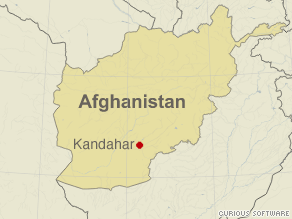Hundreds of Taliban occupy Afghan villages
- Story Highlights
- Afghan officials: Hundreds of Taliban fighters occupy villages outside Kandahar city
- NATO and Afghan forces redeployed to meet the threat
- Advance into villages comes less than a week after hundreds of fighters escaped jail
- Next Article in World »
KANDAHAR, Afghanistan (CNN) -- Hundreds of Taliban fighters have taken over several villages in the same southern Afghanistan province where about 400 Taliban militants recently escaped from prison, local officials and police said.

Kandahar is the second biggest city in Afghanistan and a former Taliban stronghold.
About 400 to 500 Taliban militants were seen streaming into the Arghandab district of the Kandahar province late Sunday night on motor bikes and pickup trucks, said Haji Aka Jan, a tribal elder in the district.
Abdul Wali Karzai, younger brother of Afghan President Hamid Karzai and head of the provincial council, also said a large number of militants entered the district, and Afghan and NATO forces were preparing to come into the area.
Reports varied on how many villages were taken. Taliban fighters have taken at least 5 villages and could have taken as many as 13, locals said.
The villages area is about 20 km (12 miles) north of Kandahar, a former stronghold for the Taliban, and close to the prison escape.
The daring and well-executed jail-break occurred Friday and had coalition and Afghan forces searching for escapees.
Mark Laity, spokesman for NATO-led International Security Assistance Force (ISAF) said that they were aware of the report of attacks on villages.
He said that Afghan troops "are sending reinforcements and ISAF forces are redeploying within the city to see if there is any potential threat."
The prison break and the Taliban push have locals fleeing, said Norine MacDonald, president of the Senlis Council, a think tank that is based in the Kandahar province.
"Hundreds of people are moving out to get away from the fighting," said MacDonald. "Things are getting worse by the day, by the minute."
MacDonald said she has heard from locals that Taliban fighters had taken villages by positioning heavily armed fighters on the streets in the area and telling village leaders that the Taliban has taken control of the area.
If the militants are not rooted out, they will try to create their own government in the area, MacDonald said.
Pushing the Taliban out will be very difficult, MacDonald said.
"It is extremely difficult to chase these guys out of the villages when they are not wearing uniforms that say 'I am the Taliban,'" MacDonald said. "They can just put down their guns and blend in. NATO may have to decide to bomb and that could bring civilian casualties."
In Washington, U.S. Defense Secretary Robert Gates said the border region remains "a real problem" for allied troops battling a resurgent Taliban and its al Qaeda allies in Afghanistan, particularly along the rugged border with Pakistan.
"They are more of a problem in the south in Afghanistan than they are in the east," Gates said in a speech to the North American Forum. "We will just have to watch carefully and see how these agreements with the tribes are going."
The incidence of attacks in Afghanistan set record numbers in 2007 and remains on pace to match those figures this year, according to statistics from the U.S.-led coalition in Afghanistan, obtained by CNN.
As of June 6, the coalition had tallied 2,999 attacks. That compares to 7,143 during all of 2007 and up significantly from the 5,174 attacks during 2006.

The total for 2005 was 2,542 and 2004 was 2,112.
The 733 attacks by roadside bombs and other improvised explosive devices through early June are on track to exceed the 1,313 for all of last year. And the 72 recorded suicide bomb attacks in 2008 is a pace about equivalent to the 157 for 2007.
Journalist Farhad Peikar and CNN Pentagon Correspondent Barbara Starr and CNN's Paul Courson contributed to this story.
All About The Taliban • Afghanistan • Hamid Karzai

 Sit tight, we're getting to the good stuff
Sit tight, we're getting to the good stuff